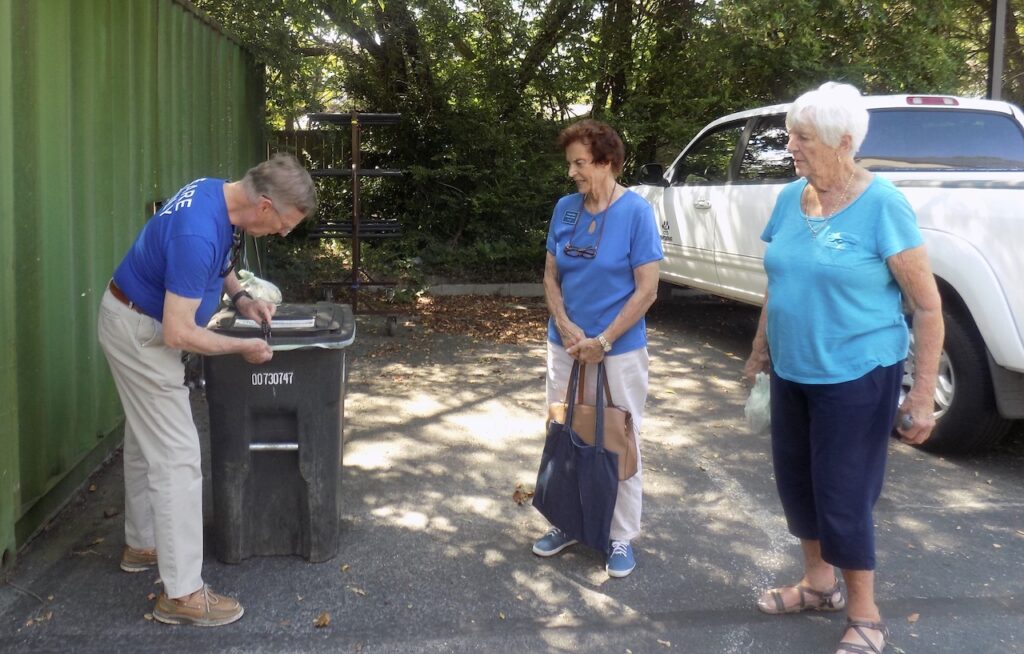The environmental ministry at Holy Family, Virginia Beach, has its latest project all tied up in the biodegradable bag.
For the past few months, the ministry has been working on developing a parish-wide composting program, with the goal of keeping food scraps out of local landfills. In June, the parish won a $750 grant from Keep Virginia Green to support its endeavors.
“Food waste that ends up in landfills decays anaerobically, where it produces a lot of methane – which is one of our worst greenhouse gases,” said parishioner Lon Scofield, who initiated the program.
Conversely, during the composting process, waste is turned over and exposed to the air. “When it’s done the correct way, it turns into beautiful garden soil,” said Scofield.
The ministry has just completed phase one of the project, a trial run in which 20 parishioners participated.
“Up until now, we have limited membership, just to see what kinks need to be worked out,” said Edward Marroni, chair of the environmental ministry. “Now, we’re excited to be able to offer the program to the entire parish.”
Sign-ups will be available during a stewardship fair to be held at Holy Family during the weekend of Sept. 9-10.
“I think the whole parish understands our call to care for creation,” said Brian Alexander, social justice minister at Holy Family. “We have been gifted with a planet, and we should take care of it. From the start of Genesis, we’re told it’s all good, and we should treat it as such.”
‘We were inspired’
The program began when Scofield read an article in a Lynnhaven River Now newsletter about a Thanksgiving food scrap collection offered by Drishti, a nonprofit composting facility in the Pungo area of Virginia Beach.
“I’ve been composting since we moved to Virginia Beach in 1975, so I was intrigued,” said Scofield.
“At Holy Family, we have been doing a great job of recycling plastic bags, to the tune of more than 1.5 tons,” he said. “But many of us have been appalled by the amount of food waste at parish events.”
The ministry invited a representative of Drishti, John Wilson, to speak at its next meeting.
“We were inspired,” Scofield said. Ministry members agreed to research starting up a food scrap collection program, but they soon learned that the Pungo facility is not yet large enough to accept the parish’s waste.
Instead, Holy Family has enlisted the help of Natural Organic Process Enterprises, a Richmond-based collection service that transports organic waste to other regional composting centers.
In the meanwhile, the ministry is doing what it can to support Drishti, by writing letters to city council and urging the council to approve the facility’s planned expansion.
“It just makes sense for it to be dealt with locally, so it doesn’t have to be trucked,” Scofield said. “This could be something good for the city, a real green feather in our cap.”
Getting started
The benefits of composting are manifold. Not only does it reduce landfill waste, but it also generates soil perfect for gardeners. Nutrient rich, it doesn’t require fertilizer, which ends up in local waterways, Scofield said.
For those who would like to join the effort, there is a one-time $20 membership fee to offset the cost of compost pick-up.
The ministry will provide new participants with ten 2.5-gallon compostable bags in which to store food scraps, including fruit and vegetable peelings, coffee grounds, tea bags, and even bones and eggshells.
Parishioner Jacki Friedsam, who participated in the pilot program, said she has purchased a mint green cannister bearing the words “Think Green” for her kitchen counter as an attractive way to store the compostable bags.
“It’s allowed me to compost when I live in a high-rise building,” she said.
Participant Joseph Kelly agreed on the convenience of the service.
“I found out [composting] can be a lot of work,” he said. “You have to turn it every day. It’s much easier to bring it to the bin.”
The ministry’s collection bin is located in the parking lot at the side of the church. It’s secured with a combination lock to deter passersby from using it to dispose of plastic and other non-compostable waste, Scofield said.
“When you sign up, we give you the code,” he said. “You drop it in the bin, lock it, and it’s as simple as that.”
“I’m proud to be a part of it,” he said, “so much so that I even volunteered to rinse out the bin.”
Answering the call
Since 2005, the environmental ministry has been seeking out new ventures, from outfitting the church with solar panels to partnering with Lynnhaven River Now to choose native plants for its gardens and retention pond.
“We began by looking into recycling programs to help the environment, and we found there were also benefits from a money-saving standpoint,” ministry member Glenn Rodriguez said.
The group has replaced fluorescent bulbs in the church with LED lights and has stopped the use of disposable cups in favor of washable ceramic mugs and glasses.
By recycling plastic bags through a program sponsored by Trex, an outdoor furniture company, the ministry has earned four garden benches, one of which it has donated to Children’s Hospital of the King’s Daughters in Norfolk.
“We’ve done a lot over the years,” Marroni, said. The ministry is hoping the composting program will be a successful new step in helping the parish family be good stewards of creation.
“We can’t be indifferent to what is happening around us,” he said. “Many other churches would benefit from what we’ve learned with our start-up, and we would be willing to assist them.”
Editor’s note: Parishes interested in starting up their own composting program are welcome to inquire with Lon Scofield at [email protected].

